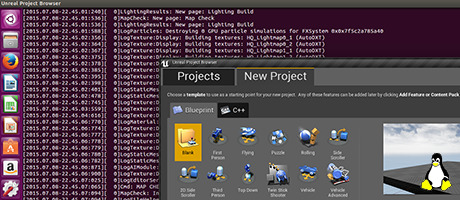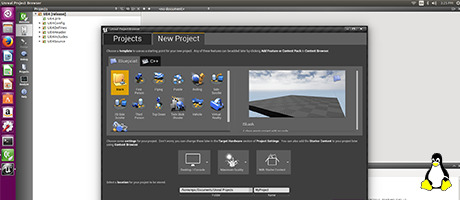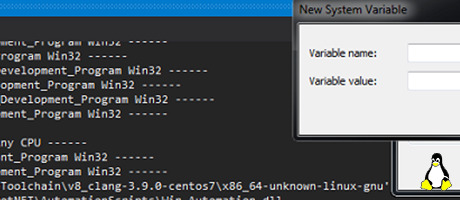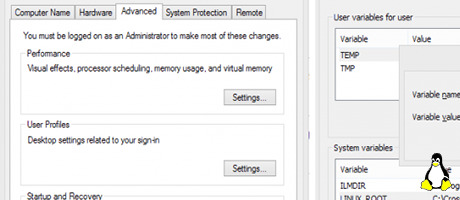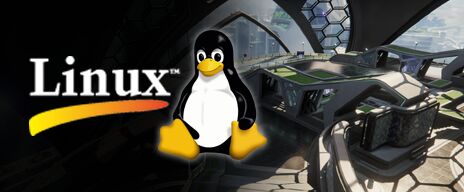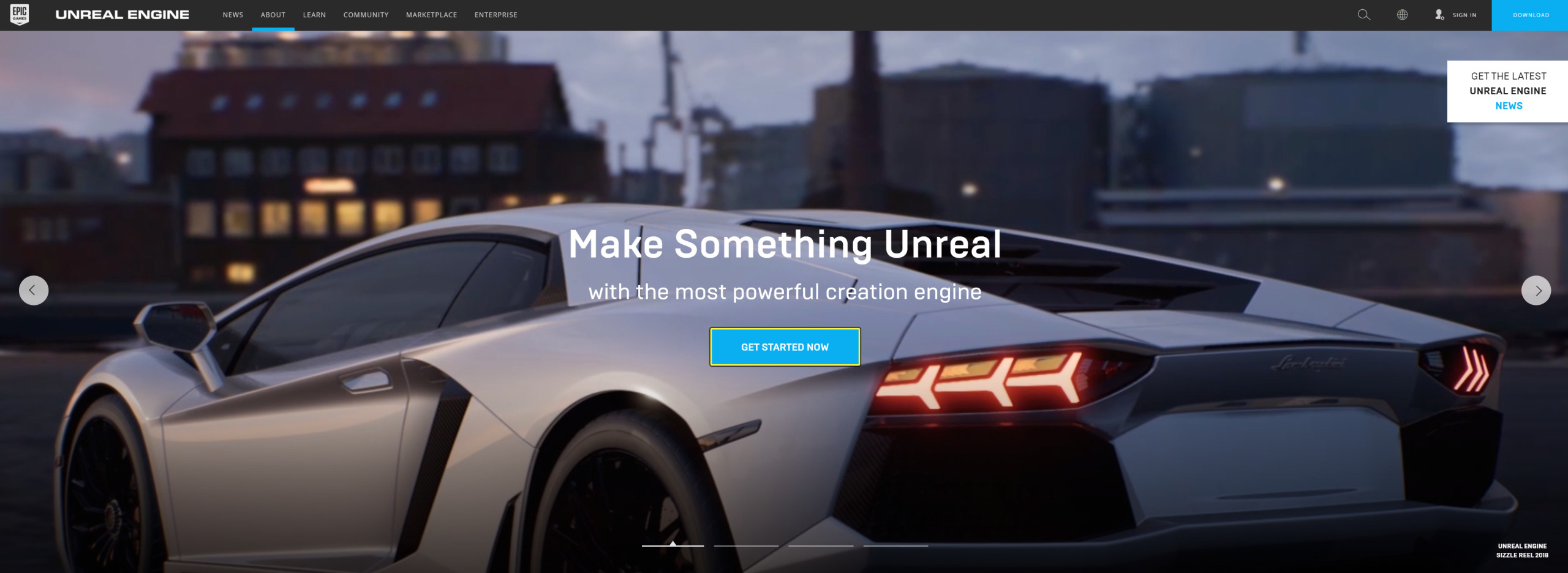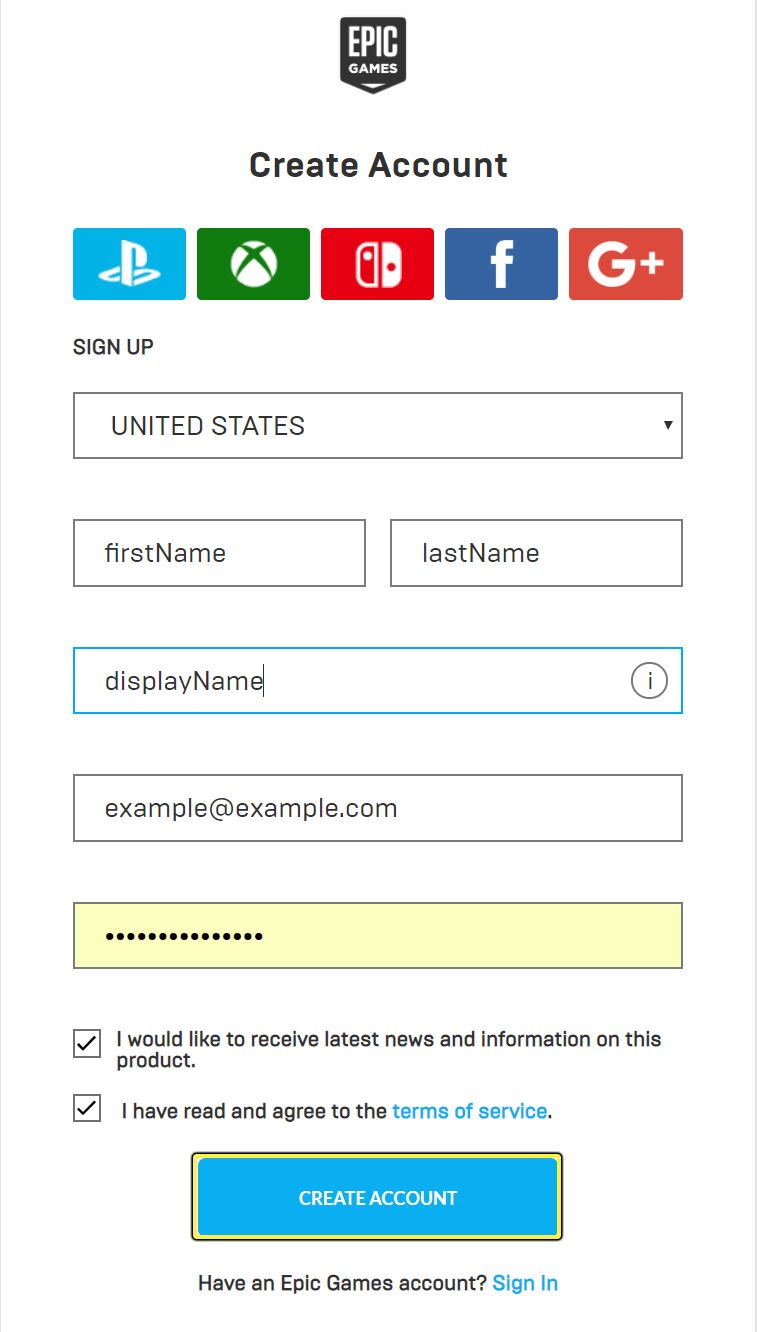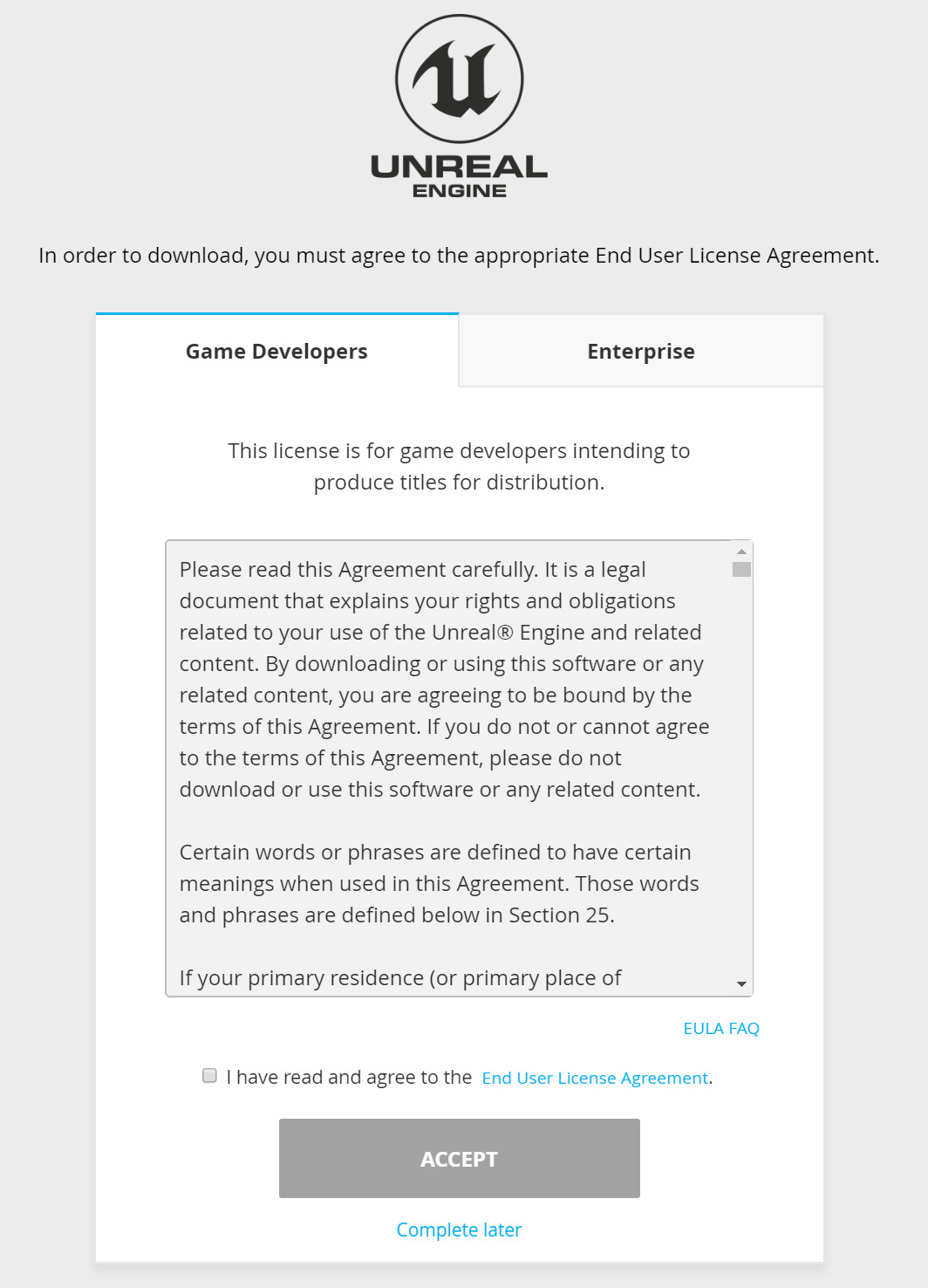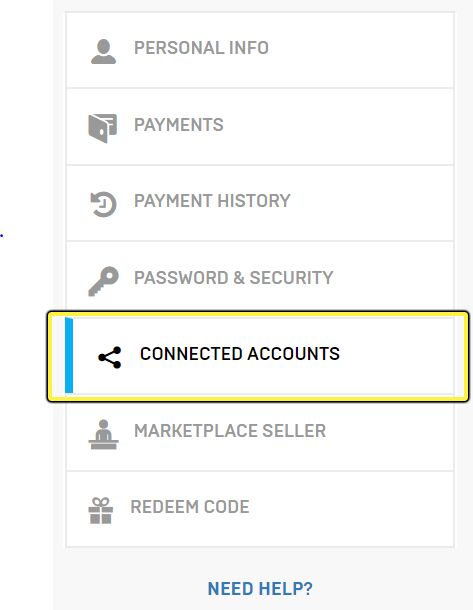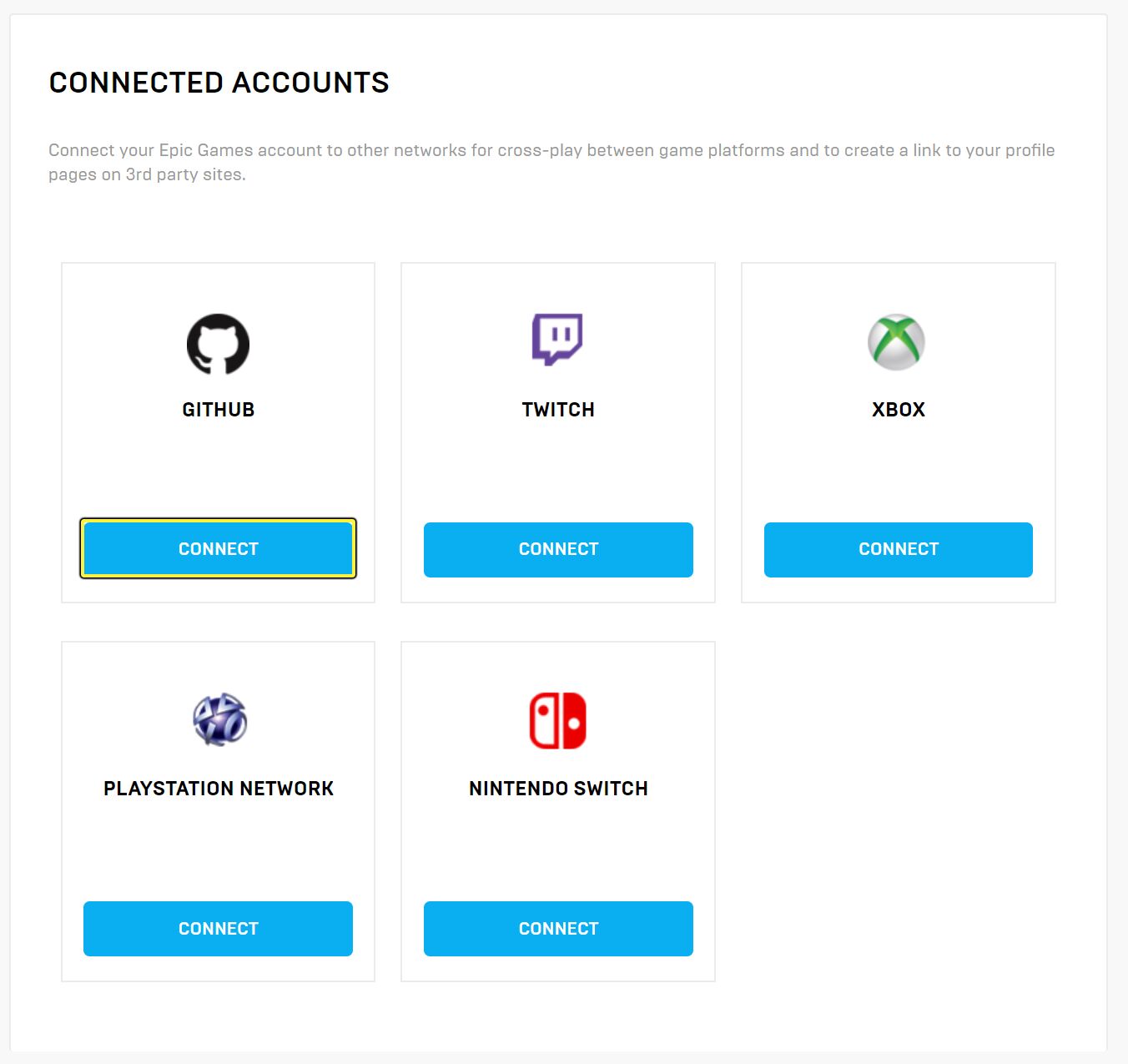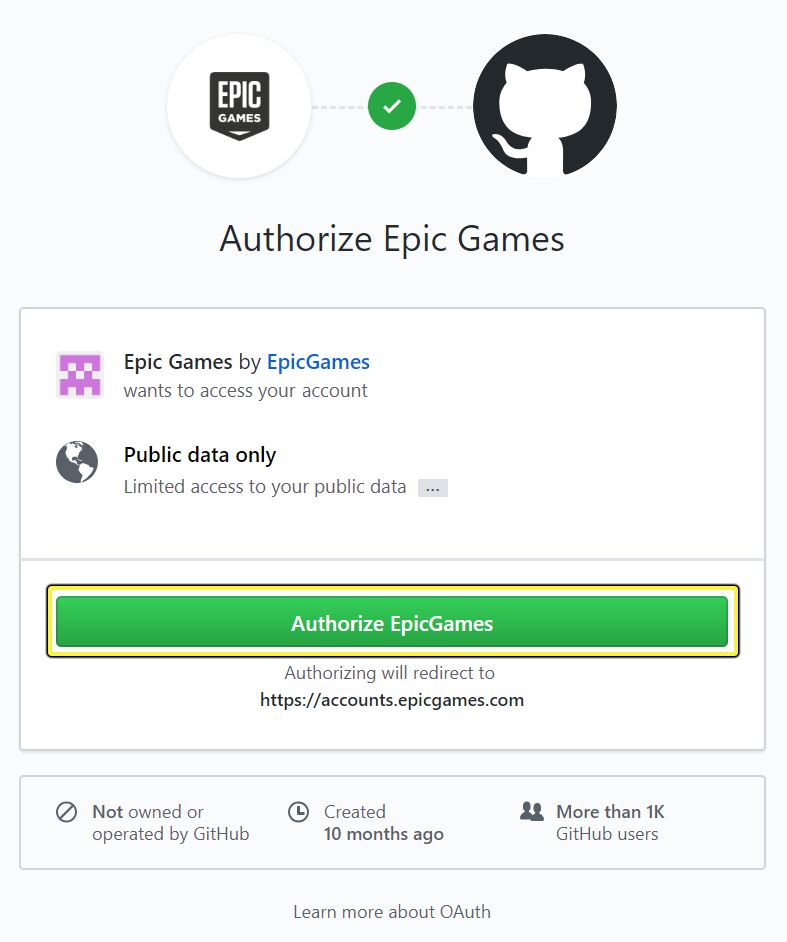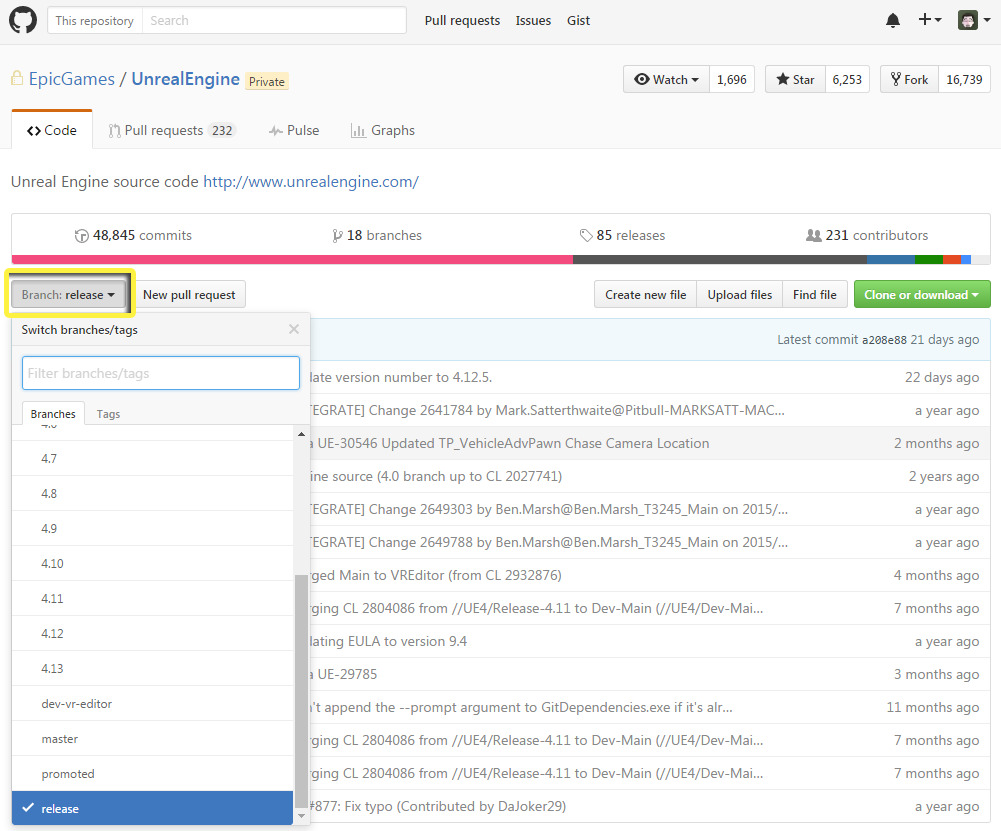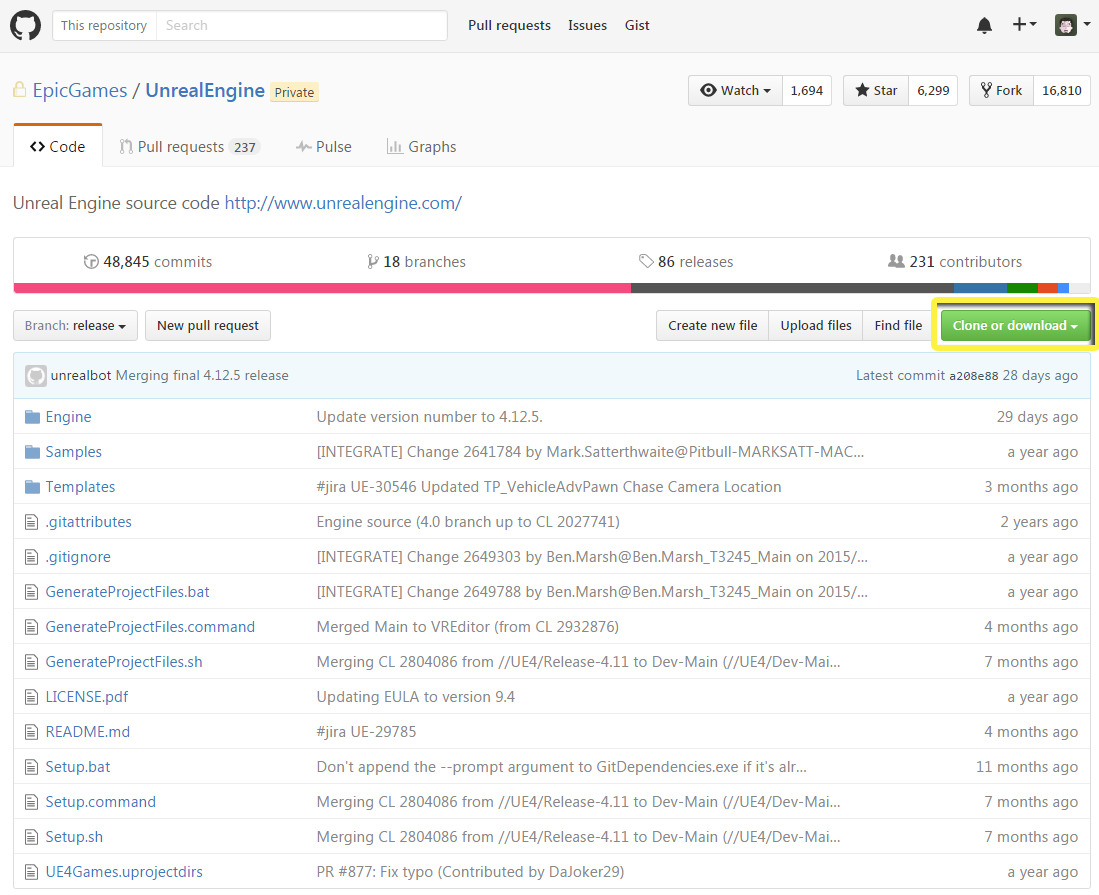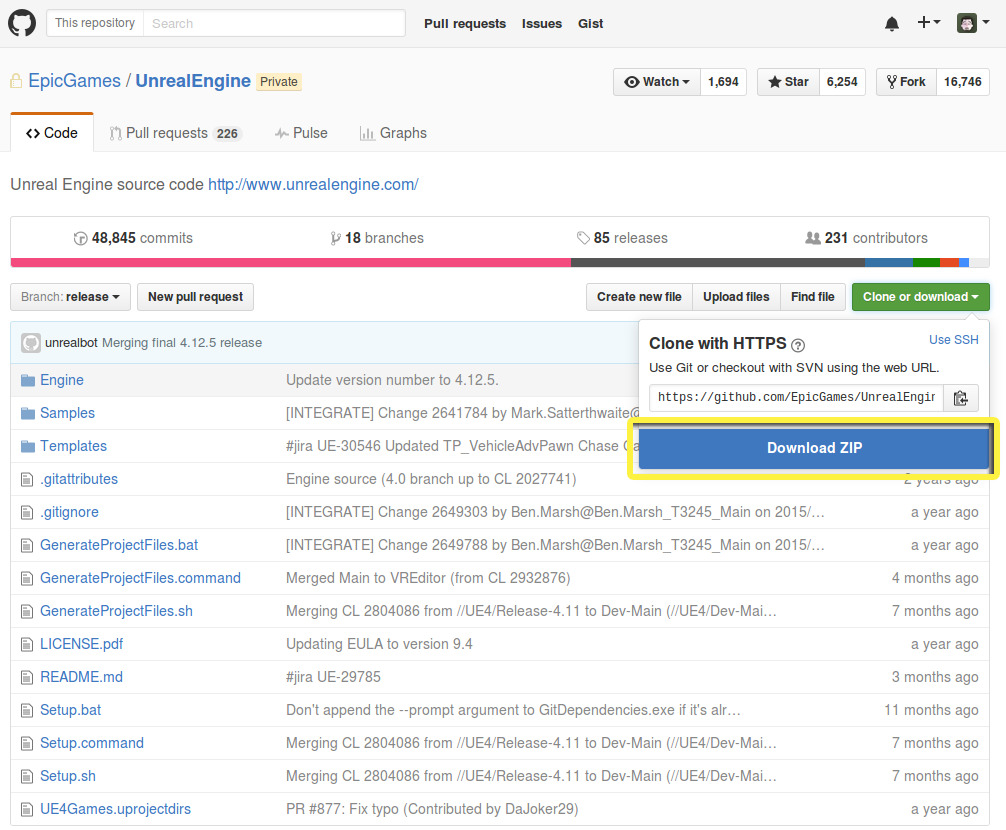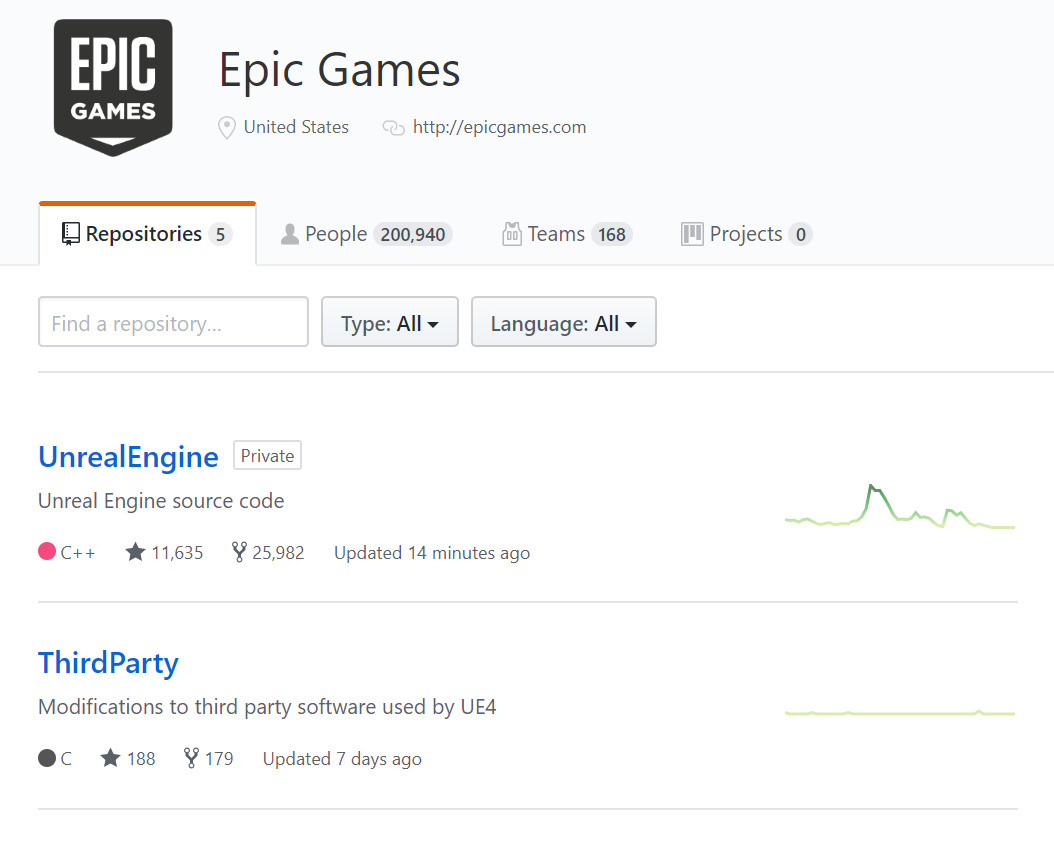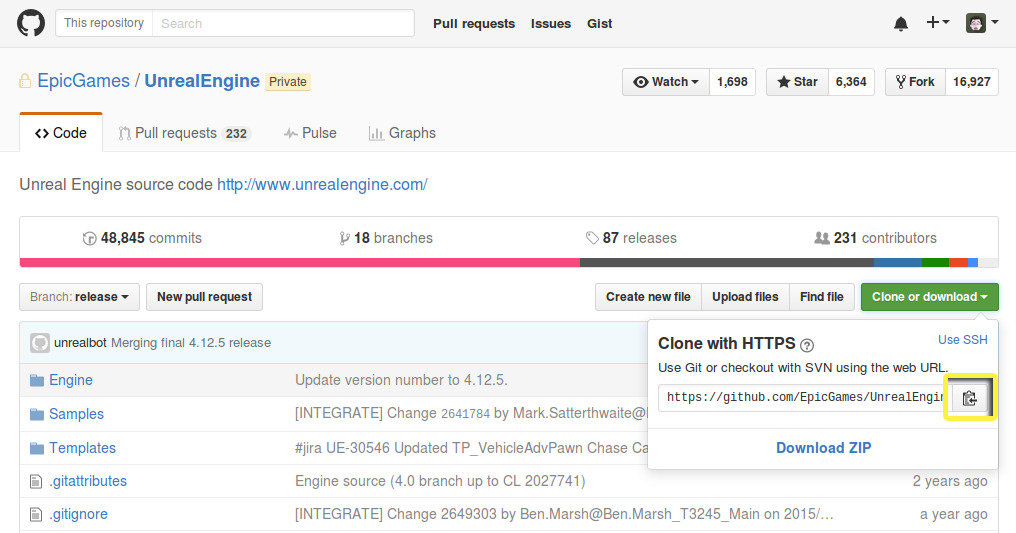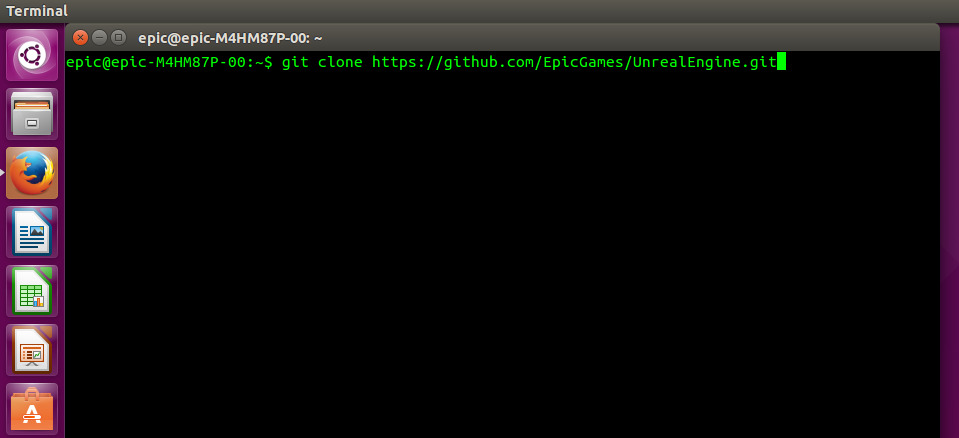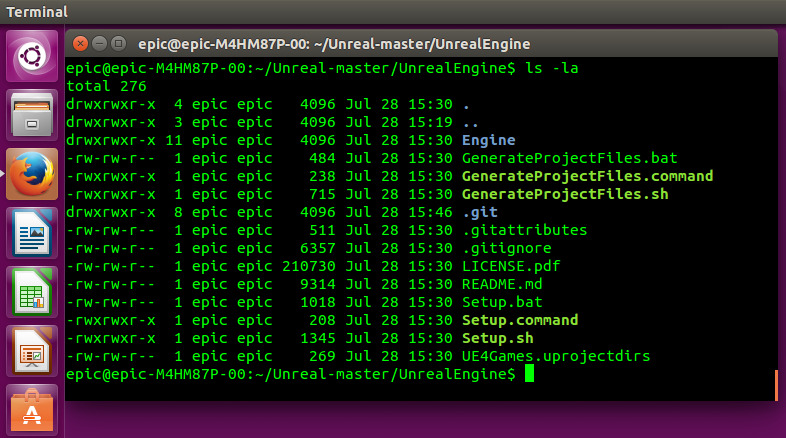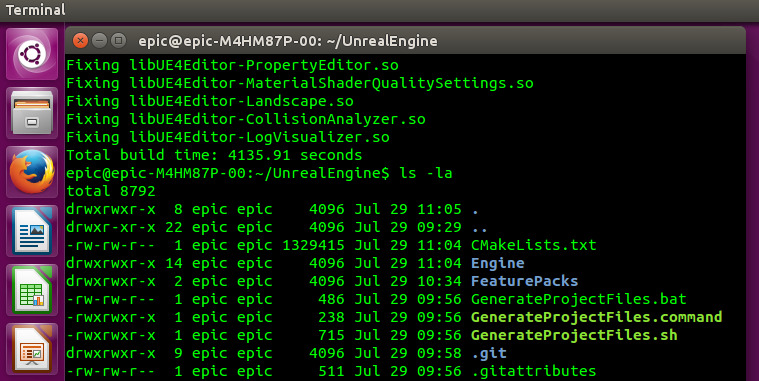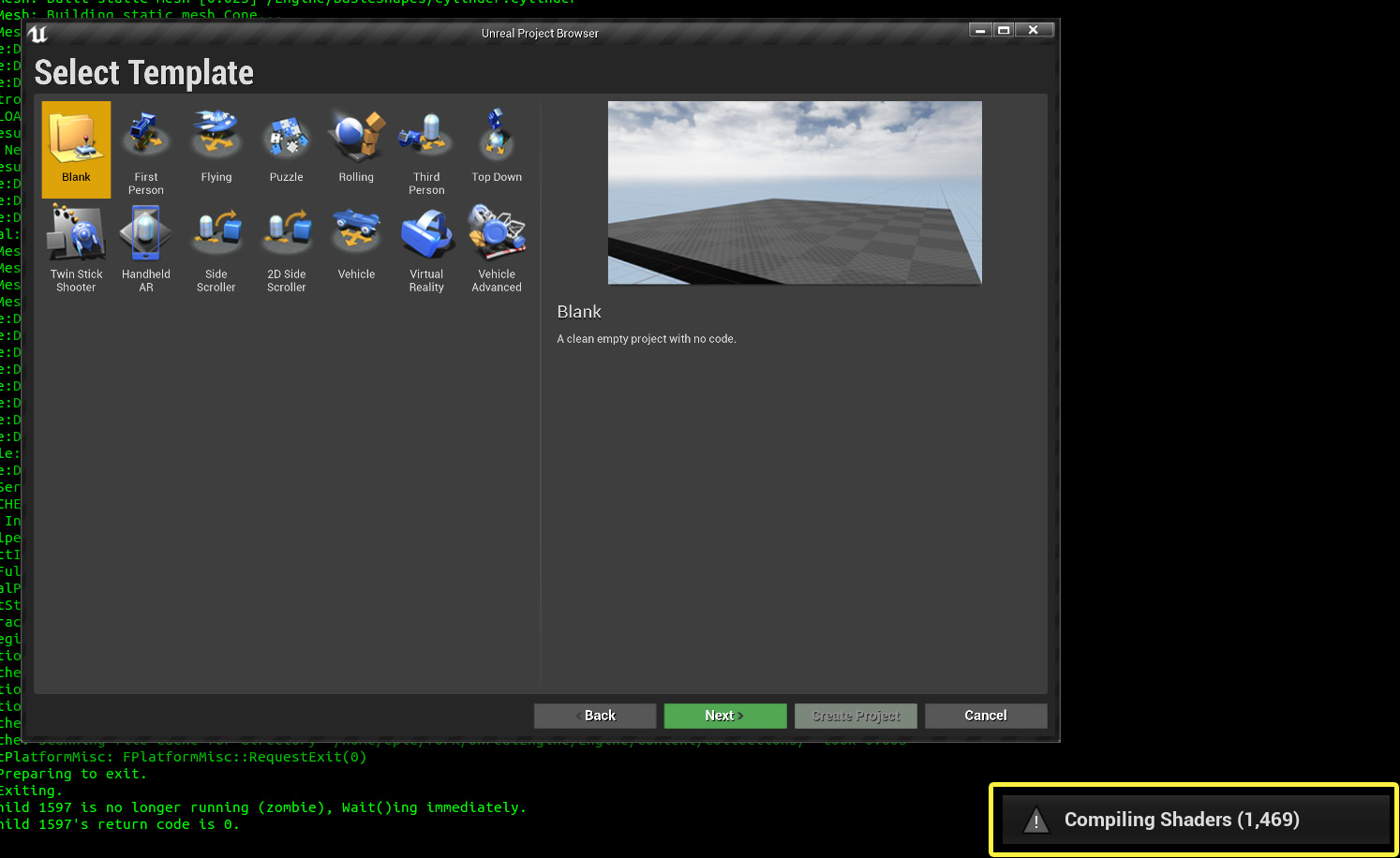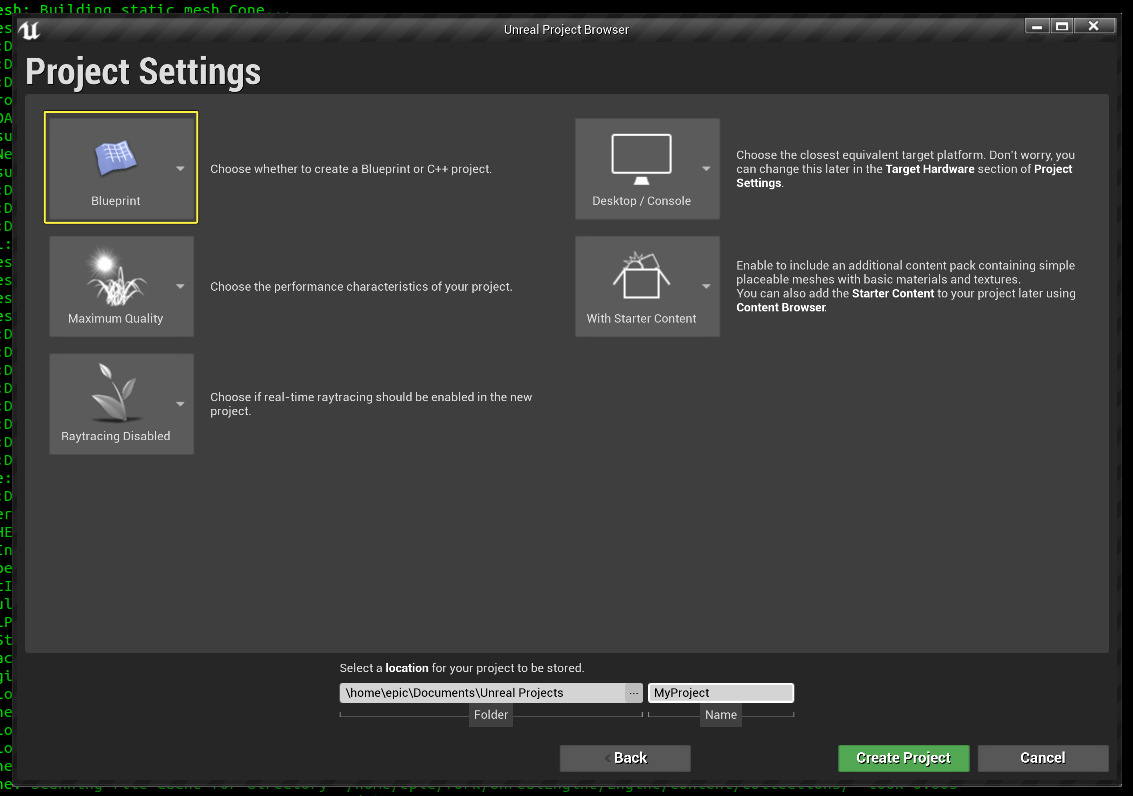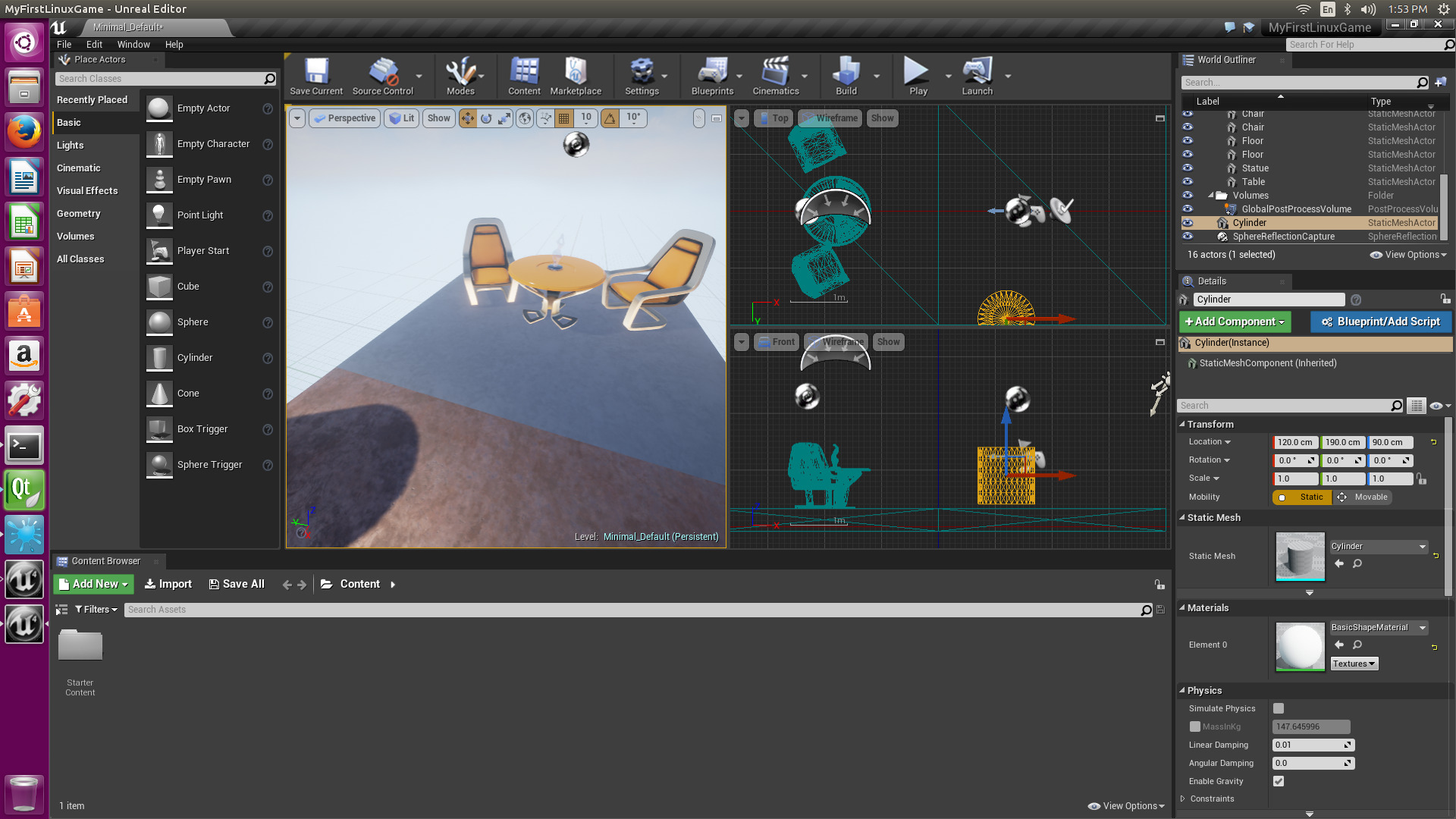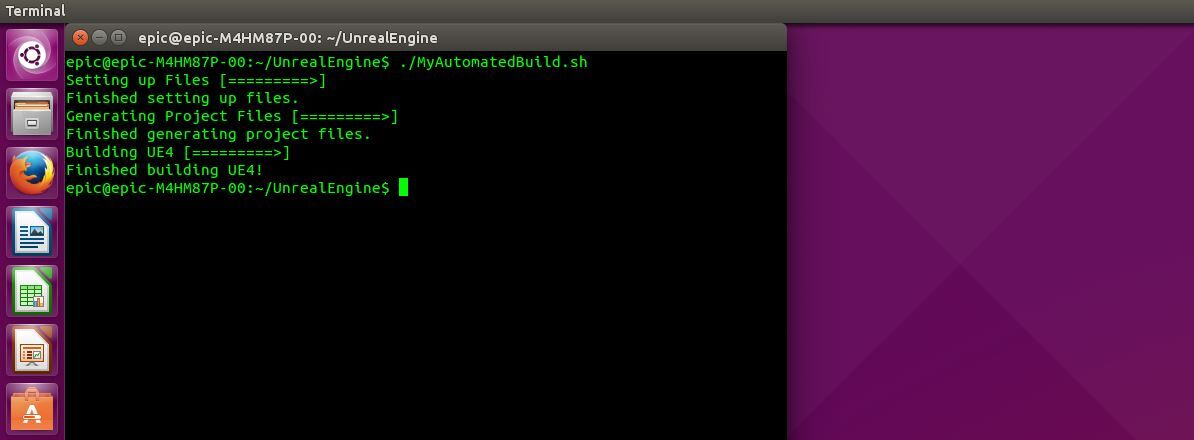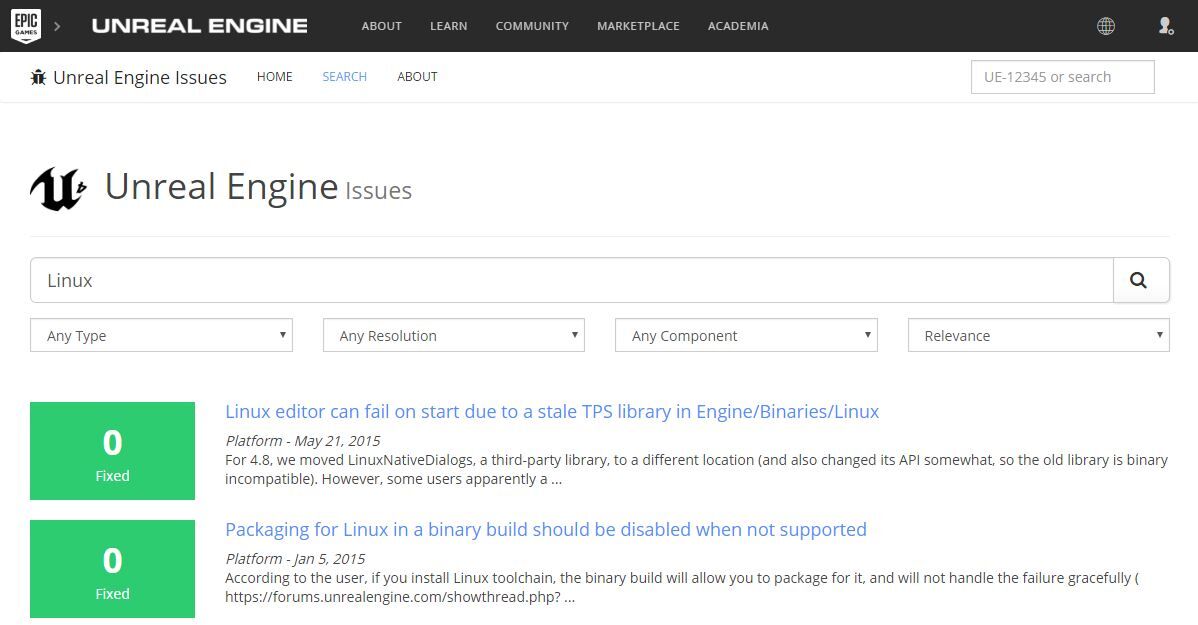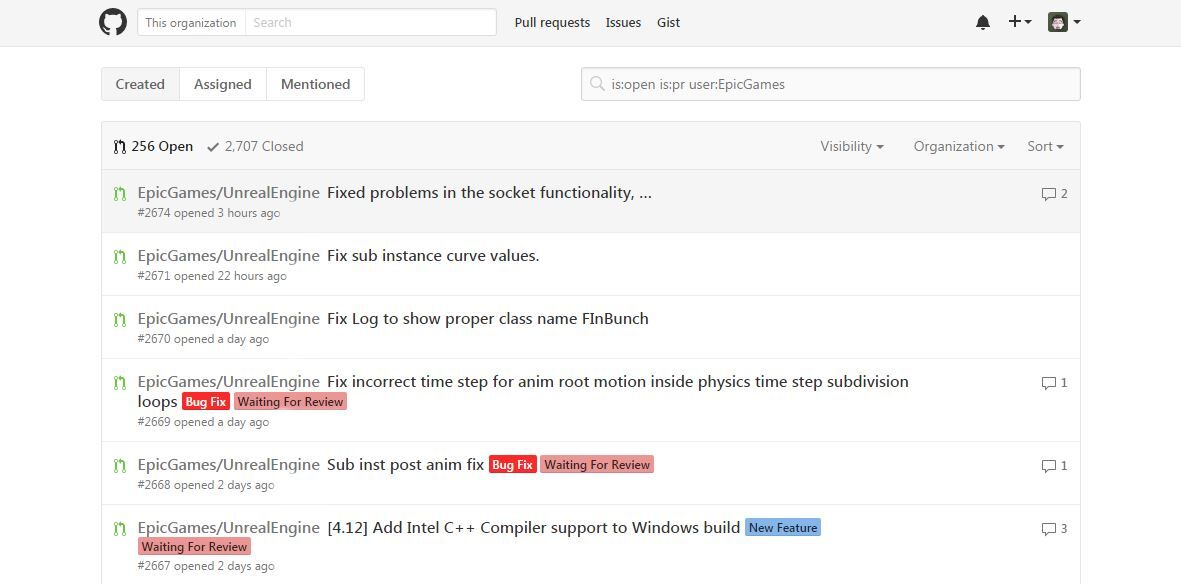- Unreal Engine 4 and Linux
- Community engagement
- Roads to be explored
- Linux Game Development
- Getting Started
- Advanced Topics
- Reference
- Linux Quick Start
- Learn how to download, build, and run UE4 on Linux.
- 1 — Required Setup
- Registering for an Epic Games Account
- Setting up Git
- Section Result
- 2 — Downloading UE4 on Linux
- Downloading from GitHub
- Cloning with Git
- Section Result
- 3 — Building UE4 on Linux
- Section Result
- 4 — Running UE4 on Linux
- Launching UE4 on Linux
- Creating your First Project
- Section Result
- 5 — On your own!
Unreal Engine 4 and Linux
While the Unreal Engine has enjoyed Linux support in the past, with Unreal Engine 4 we want to make Linux a first class member of our platform family. Our plans regarding the Linux platform balance the needs of both our internal projects and some partner projects, alongside the larger needs of the Linux community. This roughly translates to four large areas of Unreal Engine4 Linux development (each with its own unique challenges):
- robust, secure and CPU-effective Linux game servers
- full-featured Linux client support
- feature-rich, native Linux development tools
- enhancing our tools on Windows and Mac OS to make targeting Linux easy
When hearing about Unreal Engine 4 supporting Linux, it is easy to only think about the first three. However, if we want Linux to take off in the game development industry at large, we need a seamless integration with existing workflows of game companies, so that costs of shipping a Linux version of the game are minimized. That is why, somewhat counter intuitively, we need robust Windows and Mac OS tools that would allow anyone to target Linux by just recompiling and repackaging the project. This is also why we started out with cross-compilation and are planning to continue to support it, while also working to make native development easier.
We believe that this ability to target Linux (and, particularly, SteamOS) with cross-tools using the existing development environment is needed in order for it to get broader traction.
Community engagement
When we released 4.0 two months ago, we only supported Linux dedicated servers; by now official support includes running packaged games (both standalone game and client). Having SteamOS in mind, we consciously limited ourselves to the x86-64 architecture with the officially supported way of developing being cross-compilation from Windows (Mac OS toolchain will be added in the future). Documentation (admittedly scarce) of the process is maintained through the community wiki.
Needless to say, the vibrant Linux community wanted more from the very beginning ☺ Once the Unreal Engine was out in the wild, enthusiastic developers (some of them working for much bigger companies than ours!) quickly picked up the slack and started with their own initiatives, which concentrate on getting development tools running on the platform. While we had (and have) that in our plans (take a look at the engine roadmap that we recently made public), quite frankly we did not expect that to happen so soon. Yet the community managed to beat us to getting Unreal Editor to start under Linux. ☺
I feel obliged to mention by name the most active folks who were driving the community effort:
Of course there are many more folks who frequent the #ue4linux IRC channel on Freenode and our forums. Thank you so much for all the pull requests (which of course will be reflected in the credits), feedback and invaluable advice! We feel honored to have people from Google, Red Hat and MIT donating their free time to improve Unreal Engine 4 on Linux! Also special thanks to the folks at DarkSide, particularly Michael Liebenow, who have been working shoulder-to-shoulder with us on UE4’s Linux support.
Roads to be explored
Having an AAA-grade game engine available for tinkering and experimentation benefits both us and the open source community. We are stressing a lot of components of the Linux software stack (and of course drivers), which sometimes can get improved as a result (e.g. Valve’s very handy OpenGL debugger). We are looking forward to engaging with a wide variety of projects!
We believe the engine is a fertile field for all kinds of research related to compilers, and we hope that both the gcc and clang communities will take advantage of our vast code base, especially considering that we are keen to embrace the latest and newest C++11 features.
There are so many things we would like to do with Unreal Engine 4 on the Linux platform, but currently don’t have time for:
- Improve Unreal Engine 4 scalability by running a game server on a large, NUMA machine with tens (hundreds?) of CPUs and analyzing how we could utilize them
- Port it to some exotic architecture like Loongson and see what you will run into
- Port it to Linux-based devices like GCW Zero handheld or Raspberry Pi (I have partially done that in the past, and can help with building third-party libs)
- Create a freely available (yes, the license allows that, provided that you don’t distribute the sources or tools) benchmark that could be included in Phoronix Test Suite and/or used to improve Linux graphics drivers
- Port it to other *nix (FreeBSD, Solaris)
And of course, we encourage the UE4 community to use the opportunity to beat us again and be the first to ship an Unreal Engine 4 Linux game! ☺
We’d love to hear your thoughts so please head over to our forums and join in on the discussion!
Linux Game Development
Fueling the future of Linux game development is at your fingertips! Now, more than ever, you can harness the power of Unreal Engine 4 (UE4) to create and share games with Linux users worldwide. If you’re new to Linux game development, you’ll want to work your way through the Quick Start Guide before moving onto more advanced topics.
Getting Started
Learn how to download, build, and run UE4 on Linux.
Learn how to set up your IDE to build and run UE4 on Linux.
Advanced Topics
Download the Linux cross-compile toolchain.
For engine versions older than 4.14, this page shows users how to set up cross-compilation for the Linux platform.
Reference
Download the native Linux toolchain.
Linux Quick Start
Learn how to download, build, and run UE4 on Linux.
Choose your operating system:
At the end of this tutorial, you’ll have Unreal Engine 4 (UE4) running on your Linux machine, having learned how to set up Git (to download UE4 source code), how to fork and clone our source code, build Unreal Engine from source, and how to run Unreal Engine on your Linux machine. Ultimately, the focus of this guide is to show you how to set up the primary workflow needed to get UE4 running on your Linux machine.
1 — Required Setup
Currently, we don’t supply a binary installer of UE4 for Linux users. The good news is that you can compile a binary of Unreal Engine from the same source code that we use to develop the engine. If you want to access our source code, you’ll have to register for an Epic Games account, sign up for a GitHub account, associate your GitHub username with your Epic Games account, and set up Git on your Linux machine.
Registering for an Epic Games Account
If you want to create games with Unreal Engine or contribute to the future of UE4 on Linux, you’ll need to have a valid Epic Games account.
- Navigate to UnrealEngine.com .
- Click Get Unreal.
There are many benefits for having an account with us, including (but not limited to) access to the Unreal Engine community, where you’ll connect with other UE4 Linux developers, and where you’ll be able to keep up with the latest news about Unreal Engine.
Setting up Git
Now that you’ve registered for an Epic Games account, you’re ready to work through the following steps to gain access to the UE4 source code on GitHub.
- Sign up for a GitHub account at GitHub.com .
Click for full image.
Go to your Epic Games account and click Connected Accounts.
Link your GitHub username by clicking Connect under the GitHub icon.
To authorize the connection click Authorize EpicGames.
Section Result
By now, you’ve registered for an Epic Games account and linked it with your GitHub username. Also, you’ve installed Git and you’re ready for the next step, where you’ll fork and clone the UE4 source code from the Unreal Engine GitHub repository.
2 — Downloading UE4 on Linux
Now that you’ve set up Git on your Linux machine, you’re ready to download the Unreal Engine source code from our GitHub site . There are a couple of ways to download the UE4 source code, one way is to use the download feature on our GitHub page, and the other way is to clone the Unreal Engine repository with your Git client. We’ll cover both ways on this page.
Downloading from GitHub
If don’t want to clone the Unreal Engine repository with Git, you can use the Download ZIP button on our GitHub site .
- First, select the branch you want to download by clicking Branch: on the left side of the page. For more info on branches in the Unreal Engine GitHub repository, please see the Source Branches Reference page.
Cloning with Git
If you’re new to cloning with Git, refer to GitHub’s Cloning Guide before executing the following steps.
- Click the Unreal Engine link to access our repository .
Section Result
Whether you downloaded the Unreal Engine source code by using the Download ZIP button on our GitHub site , or by cloning the Unreal Engine repository using Git, you’re ready to build UE4 on Linux with the Unreal Engine source code that is now located on your hard disk.
3 — Building UE4 on Linux
In preparation for this critical step, you downloaded a copy of Unreal Engine’s source code onto your hard disk. During this part of the tutorial, you’ll get to run several utilities from the terminal to build a binary of UE4 on your Linux machine.
Our development and support teams currently use the latest version of Ubuntu; as a result, we may not be able to provide support for other Linux distributions (including other versions of Ubuntu). Additionally, read about
, and make sure your system has at least one hundred (100) gigabytes of disk space before performing the following steps.
- Inside the root directory, run Setup.sh from the terminal to setup the files needed to generate the project files.
Now, run GenerateProjectFiles.sh from the terminal to generate your project files.
To build the project, run make from the terminal.
Depending on your system’s specifications, it may take anywhere from ten minutes to over an hour to compile the engine. If you want to shorten the time it takes to compile the engine from source, we recommend compiling the source code on a machine that has at least eight (8) gigabytes of RAM, with a multi-core processor having at least eight (8) cores (including hyperthreading).
Section Result
At this point, you should have a fully built binary of UE4 on your hard disk. The time has come to run the engine on your Linux system!
4 — Running UE4 on Linux
As you worked your way to this final step, you linked your Epic Games account with your GitHub username, you downloaded the Unreal Engine source code from our GitHub site, and you compiled a binary of UE4 on your Linux system. The only remaining task is for you to run the UE4 Editor so that you can start making games for the Linux platform.
- Navigate to the editor’s binary path by entering cd Engine/Binaries/Linux/ into the terminal.
- Run UE4Editor to launch the editor.
Launching UE4 on Linux
Because you’ve compiled the engine from its source code on Linux, the engine will compile shaders for a few minutes after launching UE4.
Creating your First Project
If you haven’t already set up an Integrated Development Environment (IDE) to work with UE4, we recommend that you start out by creating a Blueprint project.
Section Result
If you’re creating your first game on Linux, you just learned how to establish your primary UE4 workflow on Linux. As you worked your way through this tutorial, you learned:
✓ How to set up Git to download the source code for Unreal Engine.
✓ How to fork and clone Unreal Engine’s source code.
✓ How to build Unreal Engine from source.
✓ How to run Unreal Engine on your Linux machine.
Are you ready to do some exercises on your own?
5 — On your own!
One way of increasing productivity is to write custom shell scripts that you can run from the terminal. If you know how to write shell scripts in Linux, try writing one that automates the process of setting up and building UE4.
If you want to track the latest developments with UE4 on Linux, read this article and head over to the Unreal Engine Public Issues Tracker to check out the latest public issues impacting UE4 on Linux.
Do you see a public issue that you can fix? If you know how fork and clone our repository to submit pull requests with Git, join our growing community of developers and help shape the future of UE4 on Linux.
If you’re looking to quickly get started making projects with UE4, check-out the following tutorials:
